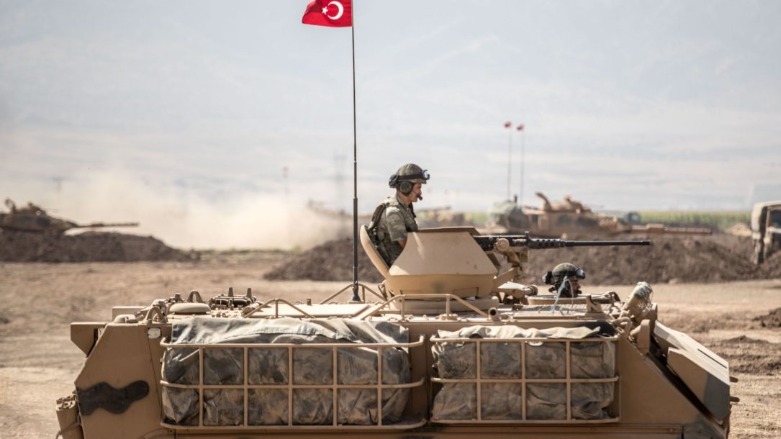Rocket attack targets Turkish base in Iraq's disputed Bashiqa
One of the rockets reportedly landed south of the base.

ERBIL (Kurdistan 24) – Three rockets fired by an unknown group Friday evening targeted the Turkish Zelikan military camp in Iraq's disputed Bashiqa district, Nineveh province.
One of the rockets reportedly landed south of the base. No one was injured or killed in the attack, according to early reporting.
Bashiqa lies in northern Nineveh province, some 12 kilometers northeast of Mosul, in territory disputed between Iraq’s federal government and the KRG.
Bashiqa fell under ISIS’ control in 2014, as the terrorist group burst out of Syria into
Iraq, occupying a third of the country. Two years later, Kurdish Peshmerga drove the terrorist organization out of the town, which is now under the control of Baghdad.
In the past, Iran-aligned militia groups affiliated with the Popular Mobilization Forces (PMF) have been accused of carrying out attacks on the Bashiqa base.
Qais al-Khazali, the founder and leader of the Iranian-backed Shia armed group Asaib Ahl al-Haq, has previously complained about the Turkish presence in Bashiqa.
“Erdogan… entered Bashiqa and won’t leave, and if he enters Sinjar and Tal Afar he won’t leave willingly… This is more dangerous than the US [presence],” he said in an interview in April, threatening that the PMF would take up arms if Turkey entered Sinjar (Shingal).
A Turkish soldier died in April when Zelikan camp was struck by two rockets fired by Iran-backed groups based in Iraq.
That attack also injured a civilian in Zelikan village and came just after an explosive-laden drone hit Erbil airport in the Kurdistan Region’s capital.
In August, three rockets targeted the camp.
Both Turkey and the Kurdistan Regional Government (KRG) have previously condemned the April attack on the camp.
In 2015, Turkey established a base in the town of Bashiqa near Mosul, where they trained Sunni Muslim and Kurdish Peshmerga units in preparations for the battle to liberate Mosul.
At the beginning of the offensive in Oct. 2016, Turkey declared it would keep its troops in Iraq "until the [ISIS] was expelled" from its stronghold of Mosul despite calls from other nations to withdraw their forces.
The Iraqi government in the past has complained about Ankara refusing to withdraw its forces after the defeat of ISIS in Mosul.
Dr. Hamdi Malik, an Associate Fellow with the Washington Institute, specializing in Iran-backed armed groups, told Kurdistan 24 that the Turkish presence in Iraq is unpopular among the Shia community.
“So attacking Turkish forces, whether verbally or kinetically is a popular move,” he said.
He added that the attacks could portray Iraq’s Iranian-backed armed groups self-styled as al-Muqawama al-Islamiyya (“the Islamic Resistance”), “as a patriotic force that is defending Iraqi national security.”
“Obviously they are accused of being loyal to Iran and not Iraq. They are not seen as patriotic forces by many within the Shia community. This gives them an opportunity to portray themselves otherwise.”